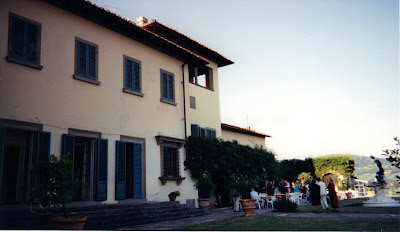Ever since I first felt the call to a life of contemplative prayer, which was sometime in 2002 (difficult to pinpoint an exact moment), it has never left me. Each and every day, almost in every hour, it enters my thoughts. This is one reason I know it's authentic -- as my spiritual director in Houston told me (God rest his soul), if a notion keeps nagging at you and won't go away, even if you consciously try to push it away, it's probably God's will.
I followed that call into the cloister, but after nearly two and a half years there, God called me back into the world to help my mother take care of my father. Now my father has passed, God has asked me to stay with my mother for as long as she needs me. The life I lead now, this relatively quiet, uneventful life, you'd think would easily accomodate the intense prayer I had in the cloister; indeed, I have tried and still try to pattern my day to include time not only for the Divine Office but also for stillness, silence, and meditation. However, I find that "the world" contiually encroaches into that silence and my mind teems with distractions. There are the distractions of the television, the internet, Facebook, Twitter, even this blog. Not five minutes go by during prayer time without some rogue internet- or news-related thought invading my meditation. It's come to the point where I've seriously thought of giving up the computer and using it only for the most necessary things. That would mean, of course, that I would also be giving up the almost daily communication I've enjoyed with dear friends, some of whom I haven't communicated with in literally decades. I was able to give that up once, with relatively little pain. Can I do it again? The television, which was in his last years my father's sole and almost day-long diversion, stands quiet for much of the day now, but even so, it's still an intrusion with its many references to violence, random sex, and materialism. The life of contemplation which I so want, and to which I'm certain God is calling me -- if it isn't to be in the blessed environment of the monastery, then exactly how does he want me to live it, right here and now, in the environment he's given me?
I know that life itself, no matter what it is or what it entails, can and should become one continual prayer. That's what St Paul urged us to do. All of us, whatever our life's vocation, are called to maintain a state of inner recollection. However, that's ever so much easier said than done. I'll just have to keep asking God how he wants me to do it. That in itself is prayer.
The Quest
I've lived too many lives in this one life
and still I seek to live the one that's true.
Perhaps the way is there, over that slope,
where a corps of rain lilies pristine white
rise serenely after their long, deep sleep.
Could I, too, lie in wait beneath the ground,
till rousing rains at long last break the drought?
Small reward -- such brief freedom in the light!
And yet those maiden blooms seem not to care
that joy is theirs but for a little while.
But, no, perhaps the way lies farther on --
there -- where the church roof peaks like fingertips
together gently pressed and upward straight
in earnest supplication to the sky.
To ask is to receive, or so it's said;
but I have asked, and answer never came.
It could be that I asked mistakenly,
against whatever plan was made for me.
Still, I asked. Is that not sufficient proof
I know the answer will be mine someday?
I have no guide except the silent sun,
upon whose face I cannot even look;
and looking round, my only company
is my gray shadow, clinging to my heels,
yet stretching still toward dust already trod.
It seems to hide from the sun that made it,
but I, in present state, am poor shelter.
There is nothing, then, but to carry on;
for the sun must surely set down somewhere,
and surely that is where my life awaits.
(08/08, first published in Lonestars Magazine )













